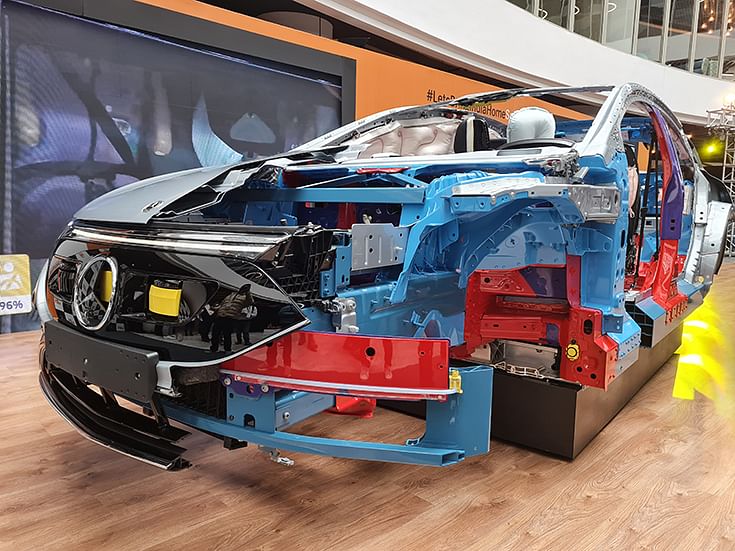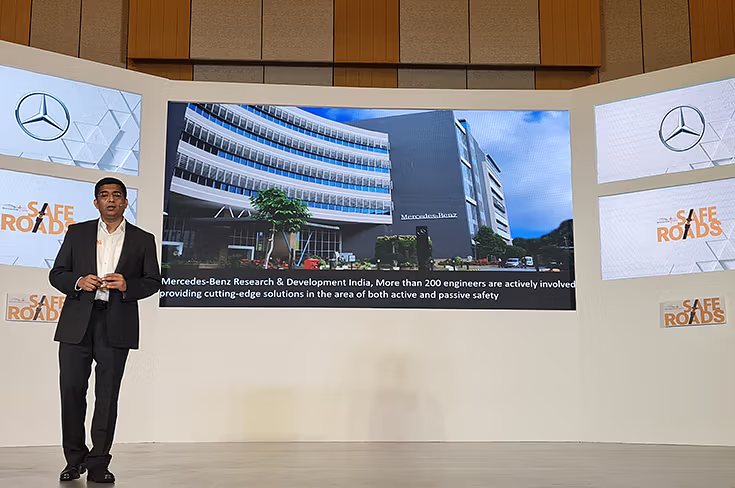Mercedes-Benz R&D India hosts third Safe Roads India Summit in Bengaluru
In line with the theme of ‘Leading Safety with Sustainability at the Core’, MBRDI showcases safety innovations that can save lives during road accidents; also unveils the world’s most efficient EV – Mercedes-Benz Vision EQXX.
Mercedes-Benz Research and Development India (MBRDI) hosted the third edition of Safe Roads India Summit in Bengaluru on December 12. In line with the theme of ‘Leading Safety with Sustainability at the Core’, the world’s most efficient electric vehicle – Mercedes-Benz Vision EQXX – was unveiled for the first time in India by Manu Saale, MD and CEO, Mercedes-Benz Research and Development India, Prof. Dr. Paul Dick, Head of Vehicle Safety, Mercedes-Benz AG, and Jochen Feese, Head of Accident Research, Concepts & Sensor-based Safety Systems, Mercedes-Benz AG, during the event.
Safety is a core value for Mercedes-Benz and its automotive brands, which are renowned worldwide for their highly sophisticated safety systems. In line with United Nations Sustainable Development Goals (SDG 3.6 and SDG 11.2), Mercedes-Benz recently announced its Vision Zero 2050, making a commitment to reduce road fatalities to 50% by 2030, as per the 2020 numbers, and achieve the goal of accident-free driving globally, by 2050.
This ambition is fuelled by ‘real-life safety’ philosophy and powered by the Group’s own Accident Research unit, which has a rich experience of analysing real-world accidents for over 50 years. In recent years, the research was expanded to include some locations in India with an aim to make accident-free driving a reality across all markets. However, the effectiveness of safety systems can be compromised if road users do not comply with traffic rules or use the safety systems onboard their vehicles.
Prof. Dr. Paul Dick, Head of Vehicle Safety, Mercedes-Benz AG said, “Mercedes-Benz is the pioneer in vehicle safety. ‘Safe Roads’ is a commendable initiative that underlines all aspects of road safety comprehensively and will go a long way in making Indian roads safer. To reinforce our commitment to make roads safer, globally, we announced our commitment to the vision of accident-free driving by 2050. This is our holistic and data driven approach to protect all road users with both active and passive safety systems, and we are committed to making this a reality.”
‘Safe Roads’, conceptualised in 2015, promotes road safety to the public through physical demonstrations, visual aids, and research reports, in a road show format. Taking the awareness to the next level, the Safe Roads India Summit, launched in 2017, focuses on various aspects of road safety including ‘Child Safety and Vulnerable Road Users on Indian Roads’ and ‘Automated Driving and Future of Road Safety in India’.
This year, the theme of the Third Safe Roads India Summit is ‘Leading Safety with Sustainability at the Core’ and several trailblazing safety innovations and exhibits, have been made available to offer a first-hand look into safety measures that can save lives during road accidents.
EQS Body in White (BiW): A ‘Body in White’ (BiW) passenger car exhibits highlights some of the core elements of a car structure which have high-tensile strength that can absorb most of the energy during a crash and minimize passenger car intrusions. In addition, safety sensors and restraint system components are visible.
 Alcohol Goggles: Alcohol goggles provide a unique experience. Wearing these special types of glasses simulates the common ‘walk-the-line’ activity which causes loss of balance and delayed reaction times. Visitors will feel their susceptibility to impairments and realize the potential severe consequences due to alcohol consumption.
Alcohol Goggles: Alcohol goggles provide a unique experience. Wearing these special types of glasses simulates the common ‘walk-the-line’ activity which causes loss of balance and delayed reaction times. Visitors will feel their susceptibility to impairments and realize the potential severe consequences due to alcohol consumption.
Manu Saale, MD and CEO, MBRDI stated, “We launched ‘Safe Roads’ to create awareness about the significance of road safety, share best practices with future road users, with an aim to reduce India’s alarmingly high road accident fatality rate. Our journey of promoting road safety across the country, first, through road shows in eight cities and now with the Safe Roads India Summit, has been very fulfilling.”
Driven by the idea of zero impact on the planet and a highly responsible use of green energy, Mercedes-Benz developed the Vision EQXX, which has been recognised as the world’s most advanced and efficient vehicle. This research prototype is packed with developments and innovations that contribute to its outstanding range. It is capable of significantly exceeding 1,000 kilometres of real-world electric driving on one charge and offers a clear indication of the route the company is taking as it strives to be all-electric by 2030. It is a part of a wider technology programme to push the boundaries of technical feasibility and to speed up the transfer of innovations to series production. MBRDI engineers based in Bangalore and Pune have made significant contribution towards building this prototype, which has been recognized as the new benchmark for EVs.
 Manu Saale, MD and CEO, Mercedes-Benz R&D India: “'MBRDI is the hotbed of action in digital-mechanical engineering, cutting-edge simulations and software development. We are taking the IT flag forward for the Mercedes-Benz Group.”
Manu Saale, MD and CEO, Mercedes-Benz R&D India: “'MBRDI is the hotbed of action in digital-mechanical engineering, cutting-edge simulations and software development. We are taking the IT flag forward for the Mercedes-Benz Group.”
MBRDI a key contributor to Vision EQXX
“Vision EQXX is a testament to our development approach. It underlines our pioneering spirit, technological leadership and expertise in electric cars, and positions Mercedes-Benz as a leading tech brand. I am proud to share that MBRDI has contributed extensively towards the development of Vision EQXX. Over the years, we have established ourselves as an innovation powerhouse with some aspects of every Mercedes-Benz car touched, modified, developed, and supported by India. In line with the plan to go all-electric by 2030 and achieving Vision Zero by 2050, our engineers are playing a major role in the development of the electric architecture and innovating for the future of safe, sustainable, and smart mobility,” added Manu Saale.
Mercedes-Benz Research and Development India (MBRDI) is the largest research and development centre for Mercedes-Benz Group AG outside of Germany. Started in 1996, the Bengaluru-headquartered organisation plays a prominent role in the development of new technologies like connected, autonomous, shared, and electric in the mobility world. MBRDI, known for its engineering innovations, has grown to a team of over 6,000 employees and is one of the earliest technology and innovation centre of a global automotive company to set up a strong presence in India.
In line with the global ambitions of the Mercedes-Benz Group, MBRDI plays a prominent role in innovating and accelerating the future of sustainable mobility. Over the last 25 years of its presence in India, MBRDI has established itself as an innovation powerhouse. MBRDI and its engineers harness the role of IT in accelerating the future of automotive technology in terms of engineering, digitalisation, testing and simulation, and data science.
While MBRDI offices in Bengaluru specialise in capabilities in digital product development and IT services, the satellite office in Pune focuses on interior component designs and IT engineering.
RELATED ARTICLES
Cosmo First diversifies into paint protection film and ceramic coatings
The Aurangabad, Maharashtra-based packaging materials supplier is leveraging its competencies in plastic films and speci...
JSW MG Motor India confident of selling 1,000 M9 electric MPVs in first year
The 5.2-metre-long, seven-seater luxury electric MPV, which will be locally assembled at the Halol plant in Gujarat, wil...
Modern Automotives targets 25% CAGR in forged components by FY2031, diversifies into e-3Ws
The Tier-1 component supplier of forged components such as connecting rods, crankshafts, tie-rods, and fork bridges to l...






 By Autocar Professional Bureau
By Autocar Professional Bureau
 14 Dec 2022
14 Dec 2022
 6616 Views
6616 Views






















